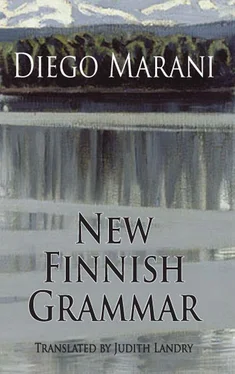After Ilma’s departure, my life resumed its dubious normality. I swallowed the days down whole, like shots of koskenkorva ; I had also started to resume my regular visits to the Kämp, and my occupation as general dogsbody. At times I would accompany my journalist friend on his expeditions around the city and the outlying countryside, together with an eccentric ambassador friend of his, visiting bombed-out villages and abandoned prison camps. As Ilma had predicted, everything was now sunk in yellowish mud. The streets were slimy canals down which our vehicle slithered, sending up spurts of mushy filth. Nature was slow to reawaken; in the fields, the trees still looked completely dead, and the huts where the refugees were lodged added further desolation to the landscape. The fact that the days were drawing out seemed to be serving no purpose; for weeks on end the sky remained smoky and louring, so near the earth that it too looked as if it were soiled with mud. In the time for which I could find no other use, I wandered round the city, calling on all the people called Karjalainen I found in the phonebook. Mostly, no one came to the door; or I would be shown into dark hallways to find old women seated stock-still beside the window, or frightened families who looked at me with alarm, fearing bad news. I went up the stairs of half-empty buildings, repeated my name and received blank looks in return. I unearthed dusty little worlds of people living buried in their own houses, with nothing but a bed, a table and a tea chest of potatoes covered with a scrap of sacking. I would be met by limp bodies whose reptilian movements spoke of long confinement; by absent glances, muffled voices. They responded to my questions with incomprehensible answers, repeating them in precisely the same words when I shook my head to tell them I had not understood.
One afternoon at the end of April I ventured as far as the new parts of Vallila, where the houses petered out and the roads crossed the railway to disappear into the open country. The day was mild and windy, the sky streaked with white. It had not rained for several days and the wind had at last dried out the ever-present layer of mud. The tracks of dried earth running across the fields looked like petrified snakes, with the odd military lorry lumbering along them, sending up a line of dust like a whip-lash trail of dynamite, glowing on the horizon. I was walking along a road called Teollisuuskatu, looking for number 456, which turned out to be almost the last house, near the brick buildings by the railway. It was a large modern apartment block, with stone balconies and small windows, the main door separated from the road by a stretch of grass. I went into a gravelled courtyard, lined with rows of closed shutters. A red-haired man was mending a motorbike by one of the walls, his tools spread out beside him on a scrap of cloth; he was kneeling on the ground and peering into the open engine.
‘Excuse me, I’m looking for the Karjalainens. Heikki Karjalainen,’ I explained.
‘Second floor,’ he said, pointing towards a flight of stairs; I could hear my steps echoing out through the courtyard as I climbed them. Seeing a brown-painted door bearing a nameplate carved with the words H. Karjalainen, I stopped and listened. A smell of musty cellars rose through the air; somewhere, a wireless was playing. I pressed the brass bell; the door opened a crack and an elderly man appeared.
‘Yes?’
‘Are you Mister Karjalainen?’
‘Yes.’
‘I need to talk to you. Can I come in?’
The man peered at me from over his spectacles, hesitating for a moment before he let me in. I found myself in the gloom of a shabby living room. The only window looked out over the courtyard; I noticed a crumpled newspaper lying on a threadbare sofa. The wall opposite the window was occupied by a dark sideboard, on which stood a ticking wooden clock, decorated with stags.
‘If it’s to do with Sampo, we already know,’ the old man whispered.
‘Sampo?’ I gave a start. It was only then that I noticed a shelf cluttered with sacred images in one corner of the room, lit by a little oil lamp, in whose flickering light I now glimpsed the black-edged portrait of a sailor in uniform. I took down the photograph and went up to the window. His jacket was identical to my own; or rather it had the same collar, but the buttons were metal rather than horn. The old man followed me, shuffling around the room.
‘Second Lieutenant Manner has already been. He said it happened on the twenty-third of August.’
I stared at that face as though my life depended on it, seeking some resemblance to my own: eyes, mouth, hair. Could it be me?
‘The twenty-third of August,’ I repeated as if in a daze.
‘Yes, the day my wife and I went to eat at Kappeli’s to celebrate our wedding anniversary. I remember it well. We should never have done it, I could feel it that same evening as we were getting on to the bus. Something just wasn’t right: that red sun on the sea, our long shadows on the cobbles in the square. When you have a son who’s on active service, you don’t go to a restaurant. We were eating baked salmon and rice pudding while our son was dying; and what place is there in this world for a mother and father who have lost their son?’
The old man left the question dangling in the charged silence of the room; he was looking towards the window, and the pale light from the courtyard was reflected in his thick spectacles; behind the lenses, his eye sockets looked like two reptiles in jars of formalin.
‘That news drove Leena clean out of her mind,’ he whispered, pointing towards the half-closed door of the next room. ‘She’s like one of those soldiers who’ve trodden on a mine and got off scot-free. You must have seen them: they just sit there like statues. They look perfectly all right, just like you and me; but they don’t see, and they don’t hear. They’re like the walking dead.’
I looked around me in some disquiet, running my eyes over the room — the sideboard, the sofa, the marble table — in search of some familiar object.
‘What … what exactly happened to Sampo?’ I asked.
‘Second Lieutenant Manner said it all happened very fast. A torpedo. The Riilahti listed, caught fire and sank. All dead; but they never found Sampo.’
‘Never found him?’ I asked sharply. Noting my sudden agitation, he looked me straight in the eye for the first time.
‘Did you know him? Was he a friend of yours?’
‘I … I am called Sampo Karjalainen!’ I burst out, clutching the sailor’s portrait in both hands.
At that moment a shriek tore through the silence of the room: an old woman in a dressing-gown appeared at the door, walking towards us with staring eyes and shrieking ‘Sampo! Sampo!’ I retreated to the other side of the table in alarm.
‘Leena! Calm down! Leena!’ repeated the old man gently as he tried to restrain the woman; after a few moments she collapsed on to the sofa, fixing me with a frightened stare and whimpering.
‘Leena! What’s got into you? The gentleman won’t do you any harm, he’s just come to pay us a visit!’ He turned back to me, pulling a chair out from the table.
‘Please, do make yourself at home! What a fool I am, I haven’t even asked you to sit down! We have so few visitors, you see, I’m out of practice. Now, let’s make a pot of tea! Eh, Leena? A nice cup of tea for the gentleman! A cup of tea, that’s what we need,’ said the old man, opening the sideboard and setting teacups, saucers and teapot down haphazardly upon the table.
‘Let’s talk about Sampo,’ he added, carrying on talking as he went into the little kitchen, where I could hear him striking a match.
‘Sampo liked to have tea with us when he got back from work. Always cheerful, that boy! He would sit just where you’re sitting now, and tell us all the latest news.’
Читать дальше












